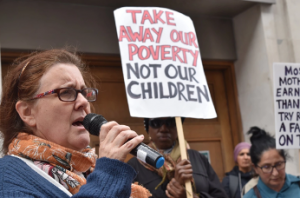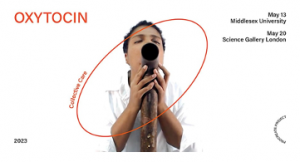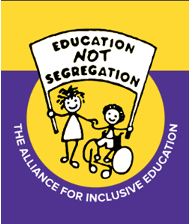- Telling our stories in Zoom workshops and group meetings.
- Speaking up as disabled mothers at public meetings and policy discussions on social care, independent living, disability rights, benefits.
- Taken part – in person or on Twitter online -- in the monthly picket of the Central family court called by Support Not Separation. And many mothers can't be public but our experiences are represented there. See an early video of the picket on International Women’s Day, March 2017.

- Evidence to the Independent review of children’s social care August 2021. Read our joint testimony with Legal Action for Women/Support Not Separation. Nearly half of the cases given concern disabled mothers.
- The Review put out recommendations in May 2022 -- we are worried that increasing the number and involvement of social workers and other professionals, rather than providing practical support to mothers, will increase disability discrimination. More info here.
- 11 May 2023 — We reacted to the government proposals in response to the recommendations coming from the Independent Review, and invited mums to have our say: “If you want to respond to the government’s consultation on their proposals following the Independent review of children’s social care, you can do so here. For background, see Support Not Separation’s blog including our joint response to the Review and our response to the government’s proposals. We don’t want more professionals embedded in our communities or money poured into more social workers & foster carers. We want money and support to go directly to mums and families to keep families together. And we want an end to privatised companies making millions from the child removal industry.”
- Evidence for the Shadow Report by disability organisations on whether the UK government is following the UN Convention on the Rights of Persons with Disabilities. In particular, Article 23 -- Respect for home and the family, the right to found a family and be supported.
- Talking to organisations and social care campaigns so people know more about disabled mothers, the discrimination we face, and what they can do.
- May 2022 Local Council elections -- people used our template letter to question candidates on support for mothers and children, for independent living and against homecare charges for support services.

4 May 2023 Webinar: Parental Advocacy and Representation: Learning from experience — organised by Parents, Families & Allies Network (PFAN)
Tracey Norton from the Disabled Mothers’ Rights Campaign & SNS spoke at this webinar. It was organised by Parents, Families & Allies Network (PFAN) to discuss parent advocacy, to tell the government what advocacy support mums/kinship carers and families need in child protection/family court hearings.
We raised that advocates (including family members if appropriate) must be publicly funded and INDEPENDENT so mums get the support we need to put our case to often hostile authorities.
11 May 2023 — We reacted to the government proposals in response to the recommendations coming from the Independent Review, and invited mums to have our say.

“If you want to respond to the government’s consultation on their proposals following the Independent review of children’s social care, you can do so here.
For background, see Support Not Separation’s blog including our joint response to the Review and our response to the government’s proposals. We don’t want more professionals embedded in our communities or money poured into more social workers & foster carers. We want money and support to go directly to mums and families to keep families together. And we want an end to privatised companies making millions from the child removal industry.”
13 May 2023, “Oxytocin” event at Middlesex University, London

Part of the Oxytocin — Collective Care festival which aims to “bring together art, performance and health care to investigate current debates in birth and motherhood/parenting”. (Oxytocin is the “love hormone” produced in childbirth.)
Tracey Norton spoke on the panel ‘Exploring the experiences of deaf and disabled people in maternity care’. WinVisible women took part in the open discussion which followed.

Panel 2 – ‘Exploring the experiences of deaf and disabled people in maternity care’ with BSL interpreters
Speakers:
- Meghan Luton – Meghan is a Middlesex university midwifery lecturer researching deaf women’s experiences of maternity care .
- Natalie Whyte – Natalie is part of the Mum-PreDiCT project (exploring the experiences of pregnant people with 2 or more long term health conditions),user voice representative for the Midlands for maternity services, maternal medicine engagement lead for the West Midlands.
- Sahera Khan – Sahera is a Deaf, Muslim, BSL user and a freelance writer/creator, artist/actor, filmmaker and YouTuber. She is a Trustee of Deaf Ethnic Women’s Association (DEWA).
- Dr Hannah Barham-Brown (chair) – Hannah is a GP trainee in Yorkshire, Governor of Motability and Deputy Leader of the Women’s Equality Party with the portfolio for ‘Making Change Happen’. Between 2018 and 2022 she was a Council Member of the British Medical Association. Alongside her clinical and political work, she travels the UK giving talks about diversity and disability, in venues from the House of Lords to international publishing companies. She is a Fellow of the Royal Society of Arts, and works to support disabled people in politics, employment, travel, health and education.
- Tracey Norton – Tracey is from The Disabled Mothers Rights Campaign which works to bring disabled mothers together to defend their rights to have a family and to keep their children.
- Dr Amy Kavanagh – Amy is an award winning disability consultant, activist and campaigner. She uses social media to share her lived experience navigating the world as a blind Londoner alongside her Guide Dog Ava. Amy has recently become a mother and believes in the need for greater representation and discussion of disabled parenthood. Amy is committed to celebrating disability, mobility aids and encouraging others to learn about the social model of disability.

15 May 2023 Celebrating UN International Day of Families
We spoke at the Alliance for Inclusive Education (ALLFIE) Zoom event celebrating UN International Day of Families — about disabled mothers and disabled children in “care”, and the uphill battle for our rights.
